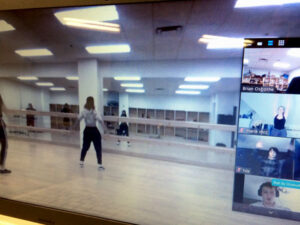By Jordan Beach

Sessions were held on Zoom while faculty and student counselors led the sessions from Reinhardt University Theater.
The well-known adage, “the show must go on,” was an accurate reflection of Reinhardt’s School of Performing Arts as they adapted last minute plans to shift the 3rd annual Musical Theatre Intensive to an online, virtual format.
In years prior, the Intensive served as an interactive, two-week experience that enabled young actors and actresses the ability to grow their skills and interests in all areas of theatre. The challenge of crafting an in-person experience virtually included teaching traditionally hands-on lessons without bringing participants to Reinhardt University Theater.
With the skill and creativity of eight faculty members, three Broadway actors and four student counselors, Reinhardt’s School of Performing Arts condensed the programming down to one week and found ways to host the Intensive’s 11 participants in a way they’ve never attempted until faced with the world’s uncertain climate.
“Moving to an online medium was not without challenges,” said Brian Osborne, music director for musical theatre and opera. “Up until now, the in-person intensive has been very hands-on, including lots of dance and movement work, not to mention one-on-one acting and vocal training. Our faculty, who brought their own expertise to each session, helped to ease the limits of the digital barrier by bringing enthusiasm and energy on the other side of the camera.”
The participants – local students, grades 8-12 – were faced with their own limitations, from limited space and lighting to dependability of Wi-Fi and the occasional pet wandering into their sessions. Despite limitations, Osborne saw “tremendous improvement” in each student’s performance and confidence.
“One of the main objectives of the program is to encourage performers to work on process rather than the final performance. There are so many elements that go into being a good performer, including vocal work, dance, acting, movement, how to audition, how to project the voice, text, technical elements of the theatre – like set design and lighting – vocal health and history, just to name a few,” said Osborne. “The final performance was terrific and was viewed by friends and family, some of them from other states. But I feel the best part was the little seeds that were planted in various areas, and the participants will hopefully continue to work on all of them throughout their lives.”
Participants also spent time connecting with Reinhardt alumni and Broadway performers about their experiences in the field. The Broadway actors included Eryn LeCroy from “The Phantom of the Opera,” Elliott Maddox from “Beetlejuice” and Tamar Greene from “Hamilton,” who hosted a masterclass at Reinhardt in January.
“It was a real treat to have Broadway performers present ‘talk-backs.’ These former students of mine all talked about their journeys, struggles and triumphs. While in-person contact with performers is always best, this format allowed them to share comfortably from their own homes and they all seemed grateful to be giving back to the world of performing arts at a time when all three of their careers have been put on hold,” Osborne said.
As faculty and students worked through the new format, it served as an educational experience moving into the Fall 2020 semester.
“We were still able to work with the students as a group and one-on-one,” said David Nisbet, theatre program coordinator. “Teaching acting, singing and dancing is difficult remotely. There is a special need for face-to-face contact in the arts. That said, however, the Intensive gave us the opportunity to learn what we needed to tweak if we are required to go fully online. I believe the faculty has a better understanding of what works and what doesn’t.”
Musical theatre major Trey Wilkerson ’22 served as a counselor this year and felt the online Intensive demonstrated the way artists around the country are working to adapt to a new normal in their industries.
“The online experience allowed us to push ourselves as artist to try things out of our comfort zone and I, for one, am very grateful for that,” said Wilkerson. “I also fully believe that the online experience worked very well. We were able to see artistic breakthroughs and personal growth and development among the students even though we only operated on an online presence. It was truly something beautiful to watch.”
Wilkerson viewed the experience as a learning opportunity for the theatre department and the University.
“It was one of the many first instances in which we were trying to maintain important facets of our community without letting health and safety fall to the wayside. I believe this experience will enable us to face challenges with a better attitude and sense of commitment because we have seen that growth is still possible even if we are confined to online platforms or modes of learning.”

